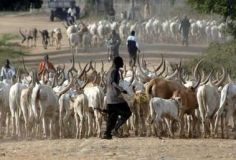Disputes expected among locals, returnees and investors in S. Sudan
Jan 13, 2006, (PULCAM CAMP, southern Sudan) — Change comes even to a remote Southern Sudan town, as Gabriel Markoy found when he returned to his birthplace after 21 years in exile during the country’s civil war.
 “When I finally got back, the government had decided that my land was part of the town expansion,” he recalls from his new home in the bush 10 kilometres from his hometown of Rumbek. “They wanted to build on it so they assigned us land here.”
“When I finally got back, the government had decided that my land was part of the town expansion,” he recalls from his new home in the bush 10 kilometres from his hometown of Rumbek. “They wanted to build on it so they assigned us land here.”
Pulcam Camp is home to 70 returnee families – about 450 men, women and children – who survive on World Food Programme rations. They hope that the rich black soils can support viable livelihoods in farming. Assisted by an FAO distribution of seeds and tools, their millet and sorghum grew high and their vegetable patches were doing nicely.
What happened next shows what many fear will be repeated across a region where two million returnees are expected and where land ownership is by customary right rather than title deed.
“This site turned out to be an old cattle camp, and one night the herds returned. By morning the animals had eaten all our grain,” he says.
Although the local authorities intervened and say the herders have agreed to move elsewhere, the returnees are treading lightly next to the more numerous and armed stockmen.
An FAO project will help Southern Sudan tackle the land tenure issue.
“The new Southern Sudan constitution says that land belongs to the community. There will be a land commission, which will work out the system of land ownership, and parliament will pass the necessary land laws,” explains project manager Michael Oyat. “FAO, which has considerable experience in land tenure issues in Mozambique and Eastern Europe, will feed into this process.”
NGOs selected and guided by FAO will conduct six case studies in different types of land disputes all over Sudan. They will use proven FAO methodologies to ensure that the landless and marginalized participate fully. The project will synthesize the findings, pull out key issues and report to Sudanese policy-makers and stakeholders at a workshop to be held in 2006.
As elsewhere in the world, land is an emotional issue.
“Land is the capital of the people of Southern Sudan,” says Michael Roberto Kenyi, director of agricultural planning and interagency coordination in the new government. “It is an indisputable resource – an asset – and it involves our emotions if anyone touches it.”
(FAO)
